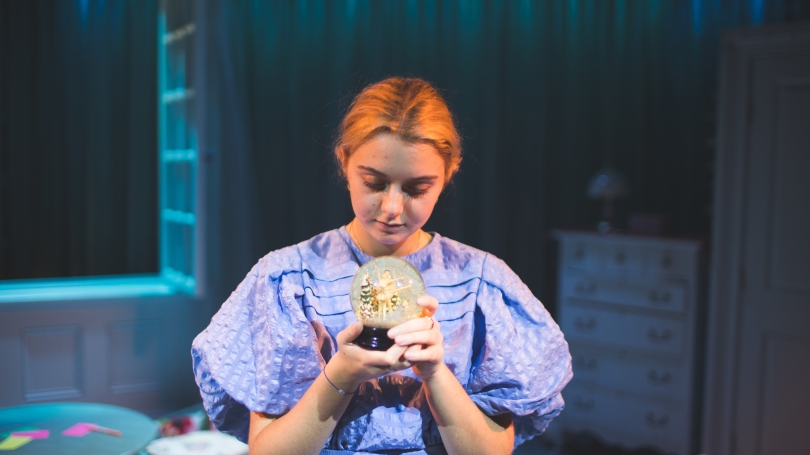Out of the Nursery: Dartmouth's "Lost Girl" Hits the Stage
Three hours a day, five days a week, Julia Zichy '27 strides onto the stage at Theater on Currier. In the glow of the stage lights, a familiar scene emerges—a nursery with its window ajar, waiting for Peter Pan's shadow to slip across the twilight sky. But it is this absence, and this waiting, that weighs on Julia—and Wendy, the character she plays in this term's Department of Theater's production—at the precipice of adulthood.
Running from October 27-November 4, Lost Girl is a poignant exploration of growing up, in all of its tumultuous triumph and misery. Inspired by J.M. Barrie's Peter Pan, it is nevertheless "not a sequel," says Director Peter Hackett. Nor is it a retelling. Rather, Lost Girl unravels the resolution in Barrie's final chapter, When Wendy Grew Up. What happens in that space in between?
From its very first scene, Lost Girl wrestles with the abrupt and jarring transitions of adulthood. When Wendy's mom decides to transform the old nursery into an office, she has to come to terms with losing a space that, in many ways, is a memorial to her past. But Wendy's attachment to this room isn't just its sentimental value: she's quite literally afraid to go outside. And so, the nursery is omnipresent, becoming the lens through which the audience filters everything else, be it the ruckus of a busy street, a detective's office or a therapist session.
When we become adults, how do we reconcile with our childhood selves? As actress Hannah Brookes '26 says, you have to decide "what parts of your childhood and your fantasy you can bring with you…but also what parts you can set aside." "Moving on" is not a clear-cut dichotomy—and it's in that grey area between holding on and letting go that Lost Girl unfolds.
A College Student's Story
Where does Julia find her Wendy? It's not in the hundreds of Peter Pan adaptations or even J. M. Barrie's prose.
In fact, it might be far more likely to find Julia's Wendy crossing the Dartmouth Green on her way to classes, or surviving the freshman fall midterms crunch. Wendy, for Julia, is "real."
And yet, there is a great deal of authenticity in choosing to portray Wendy this way. The trials that she faces quietly echo the college student's experience, whether it's acclimating to a different city or moving into an unfamiliar dorm. How do we navigate new homes, new friends and new expectations?
"I resonate with it, almost everyone in the cast does," Julia says. Beyond the magic and whimsy of Neverland, Lost Girl is unflinchingly honest about the uncertainty of adulthood. In that vulnerability, we are also given permission to see ourselves.
A College Student's Production
Lost Girl hits the stage on Friday, October 27. In the interim, a host of creative choices need to be made. From stage managers, lighting, sound, production and cast, Dartmouth students have been involved in every step of making this Neverland come to life. Working side-by-side with faculty, they get the benefit of mentorship while still having the creative freedom to provide their own input—such as Julia's decision to "not play it Disney."
As she says, many of us, and Wendy herself, "have been conditioned to this idea of Prince Charming." Wendy keeps her window propped open in the hope that Peter Pan will come rescue her—and this narrative is deeply socialized. Rather, what Lost Girl tasks us with is the difficult work of saving ourselves.
One of Wendy's most difficult revelations is that she wasn't the only "Lost Girl"—that there are in fact, many. There is both solidarity in sharing this experience with others, and heartbreak in learning that she wasn't unique. "She felt special," says Director Hackett, "and this man told her she was special and she was the only one, [but] she finds out there were dozens and dozens of Wendys." Yet, there are other ways to be special, particularly when we remove ourselves from another person's lens. "When she stops looking at herself through the eyes of Peter Pan," he says, "she has to find a way to say 'I'm really happy with who I am.'" As such, Lost Girl becomes a quest to find what makes Wendy happy, and ultimately, what she values about herself.
Courage
J.M. Barrie once said, "Courage is the thing. All goes if courage goes." It's an idea that has stuck with Director Hackett, so much so that when rehearsals began, the first thing he did was read several quotes on courage to this new cast. For him, centering courage isn't just important for the production; it's also an invaluable life lesson. "We live in a very chaotic world in the moment," he describes. "[We need courage] in order to go out and face [it], as anxiety-inducing as that may be…Every time you face a challenge or a problem, you're going to come out on the other end of it stronger, better, more confident."
Finding our happiness, our independence, self-worth and esteem: all are daunting tasks. The journey that Wendy goes on is also our own, and there is power in knowing that we don't do it alone. Lost Girl may be about our confusion and fear along the way—but it's also about our bravery in facing it head-on.
Photo: Julia Zichy '27 on stage during the tech rehearsal for Lost Girl. by Katie Lenhart
